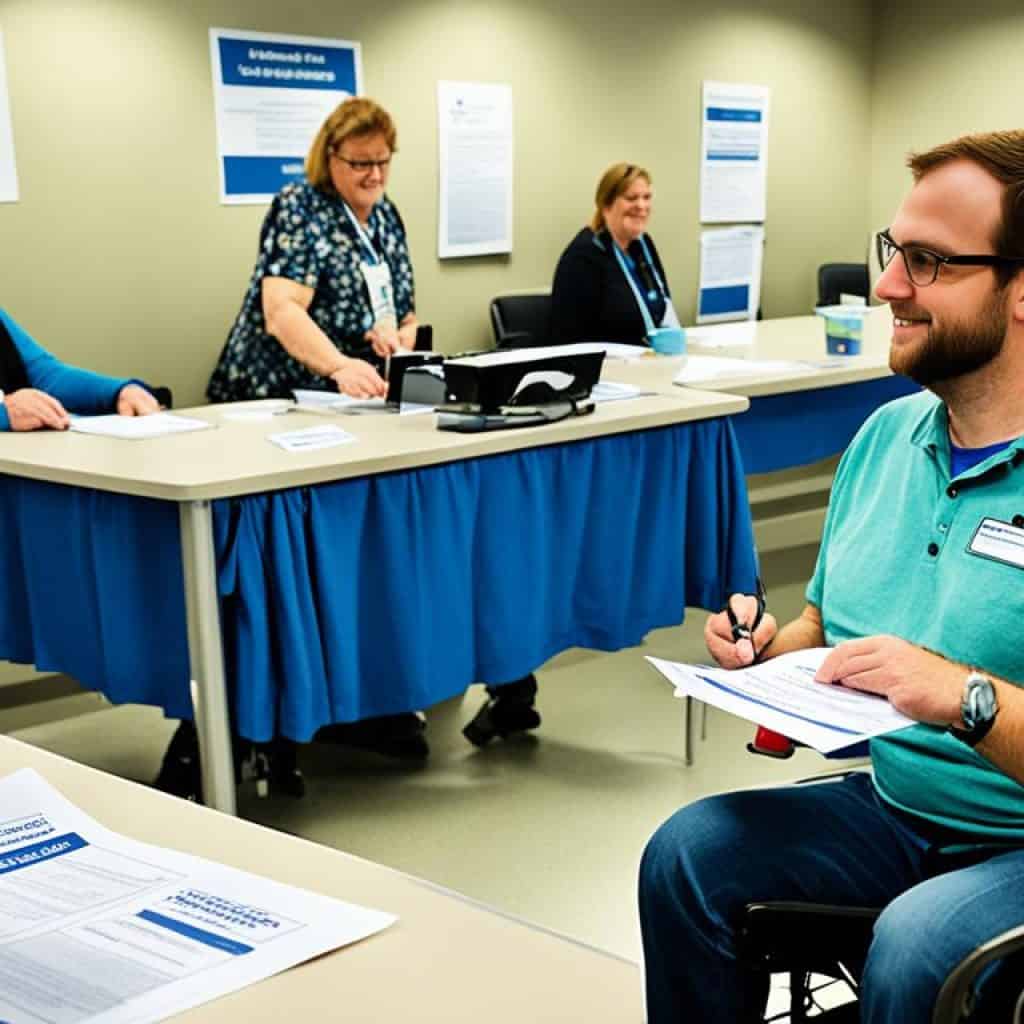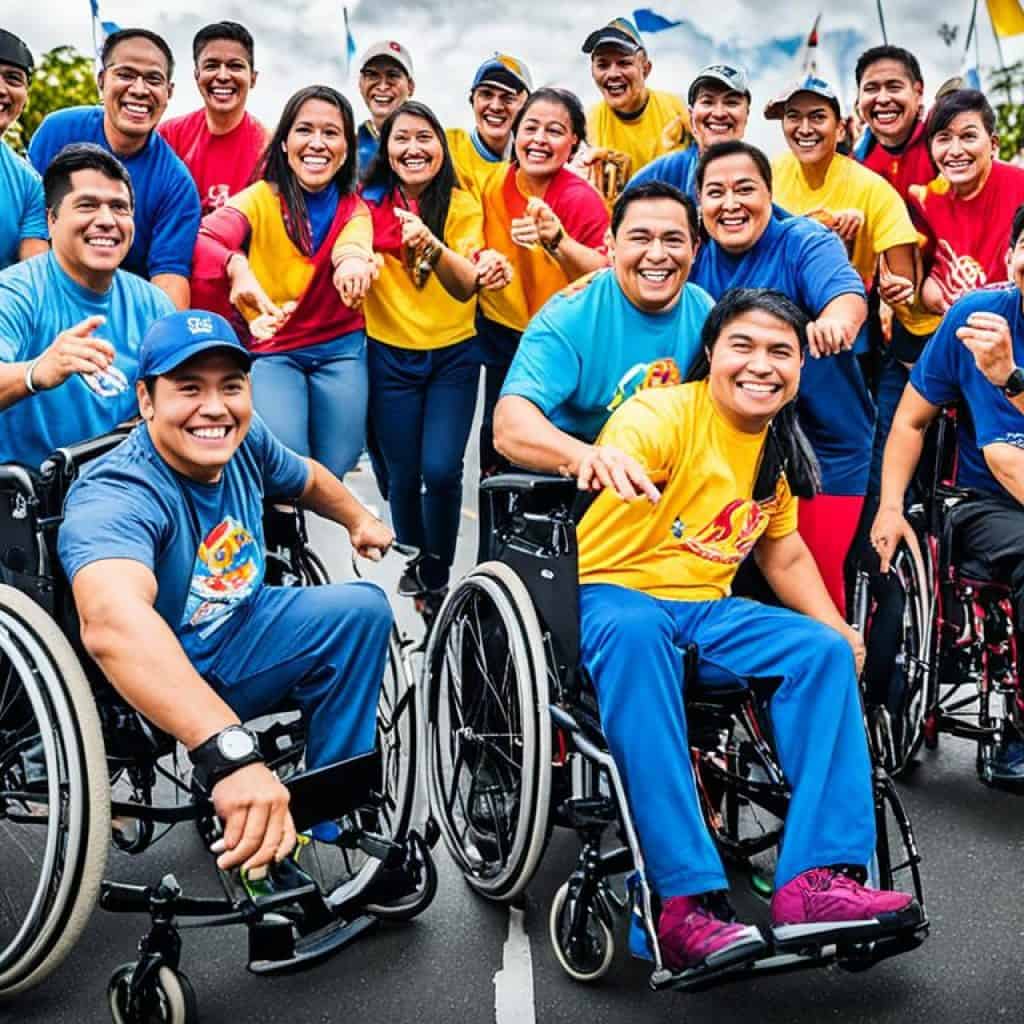Do you know the full list of PWD illnesses in the Philippines? Are you aware of the special needs conditions that qualify individuals for benefits and privileges? Discover the comprehensive guide to PWD health conditions in the Philippines for a deeper understanding of disabilities in the country.
Key Takeaways:
- Learn about the International Classification of Functioning, Disability, and Health (ICF) and its definition of PWD.
- Understand the classifications of disabilities in the Philippines according to the Magna Carta for Disabled Persons.
- Discover the special education system for individuals with learning disabilities and the criteria for visual impairments to be considered a disability.
- Explore orthopedic disabilities and communication disorders among PWDs, including examples of conditions.
- Find out the qualifications for obtaining a PWD ID in the Philippines and the required documentation.
Understanding PWD Classifications in the Philippines
The Republic Act 7277, also known as the Magna Carta for Disabled Persons in the Philippines, provides a framework for classifying PWD ID applicants based on their specific disabilities. By understanding these classifications, individuals can gain clarity on their eligibility for benefits and privileges.
Classification of Disabilities
Under the Magna Carta, disabilities are categorized into different groups:
- Psychosocial Disabilities: These pertain to psychological or social conditions that limit a person’s ability to interact with others. Individuals with psychosocial disabilities may experience challenges in managing their emotions and relationships.
- Mental Disabilities: This classification encompasses conditions such as ADHD, Down Syndrome, bipolar disorder, and other cognitive impairments. People with mental disabilities may face difficulties in learning, thinking, and socializing.
- Chronic Illnesses: While not necessarily causing disability, chronic illnesses can lead to complications that significantly impact a person’s daily life. Conditions like diabetes, hypertension, and asthma fall under this category.
It’s important to note that these classifications help identify the specific needs and challenges faced by individuals with disabilities. By recognizing and understanding these categories, the government and society can better address the unique requirements of PWDs.
This image illustrates the diverse classifications of disabilities in the Philippines, emphasizing the diverse range of challenges faced by PWDs.
PWDs with Learning Disabilities and Visual Impairments
Learning disabilities can present challenges for individuals in focusing, comprehending, and retaining information. In the Philippines, individuals with learning disabilities are encouraged to enroll in schools that have a special education system tailored to their unique needs. These schools provide specialized instruction and support to help students with learning disabilities thrive academically and develop their full potential.
Visual impairments, on the other hand, are considered disabilities when they cannot be corrected and lead to permanent blindness. It is important to note that individuals who can still see with the assistance of glasses are not classified as disabled.
Providing inclusive educational opportunities and support for individuals with learning disabilities and visual impairments is crucial in ensuring their success and inclusion in society. By implementing effective strategies and accommodations, such as personalized learning plans, assistive technologies, and accessible materials, we can empower these individuals to overcome challenges and reach their goals.
Orthopedic Disabilities and Communication Disorders among PWDs
Orthopedic disabilities encompass a range of conditions that affect the bones, muscles, joints, or limbs of individuals. These disabilities can result from factors such as amputations, scoliosis, dwarfism, or other orthopedic impairments. While these disabilities may present physical challenges, they do not necessarily hinder communication abilities.
However, communication disabilities can also coexist with orthopedic disabilities. These disabilities primarily manifest as hearing impairments and speech and language impairments.
Hearing impairments refer to partial or complete loss of hearing, which can greatly impact an individual’s ability to understand spoken language and communicate effectively.
On the other hand, speech and language impairments encompass difficulties in articulating words and using language fluently. These challenges can arise due to various factors, such as developmental delays, neurological conditions, or structural abnormalities.
Individuals with orthopedic disabilities and communication disorders may face unique challenges when it comes to participating fully in social interactions and accessing educational and professional opportunities. However, it is important to note that each individual’s experience is unique, and with appropriate support and accommodations, many can thrive and overcome these challenges.
Orthopedic Disabilities Examples
Orthopedic disabilities can manifest in different forms, affecting various parts of the body. Here are some examples of orthopedic disabilities:
- Amputations
- Scoliosis
- Dwarfism
- Arthritis
- Cerebral palsy

Types of Communication Disabilities
Communication disabilities encompass a wide range of impairments that affect an individual’s ability to express themselves or understand others. Here are two major types of communication disabilities:
- Hearing Impairments: This includes partial or complete hearing loss, ranging from mild to profound. Individuals with hearing impairments may require assistive devices, such as hearing aids or cochlear implants, to enhance their auditory abilities.
- Speech and Language Impairments: These impairments can vary in severity, ranging from difficulties with pronunciation and articulation to challenges in understanding and using language effectively. Speech and language therapy can help individuals improve their communication skills.
It’s important to recognize the unique needs of individuals with orthopedic disabilities and communication disorders and provide them with the necessary support and accommodations to ensure equal participation and inclusion in society.
Qualifications for a PWD ID in the Philippines
To qualify for a PWD ID in the Philippines, individuals must meet specific criteria outlined in the Republic Act 10754. The law recognizes that PWDs are individuals with permanent physical, intellectual, mental, or sensory impairments that significantly limit their ability to perform daily activities confidently and independently.
The severity of the disability must be assessed to be at least 20% or higher, as determined by a qualified medical professional or physician. This assessment ensures that those who genuinely require assistance and support receive the necessary recognition and benefits.
In addition to the assessment, applicants are required to provide proof of their disability, such as medical records or assessments, to support their application. Residency within the city or municipality where the PWD ID application is being processed is also a requirement to ensure the application is filed correctly.
The process of obtaining a PWD ID can be simplified as follows:
- Undergo a thorough assessment by a qualified medical professional or physician
- Gather relevant medical records or assessments to serve as proof of disability
- Ensure residency within the city or municipality where the application will be processed
- Submit the completed application with all necessary documents to the designated office, such as the Persons with Disability Affairs Office (PDAO)
By adhering to these qualifications and following the application process, individuals can obtain their PWD ID, which serves as a vital form of identification and opens doors to various benefits and privileges that aim to improve their quality of life.
List of Disabilities Eligible for a PWD ID
The Department of Health recognizes several disabilities as eligible for a PWD ID in the Philippines. These disabilities include:
- Visual Impairment/Blindness: This refers to individuals with permanent visual impairment that cannot be corrected, leading to partial or complete blindness.
- Hearing Impairment/Deafness: Individuals with partial or complete loss of hearing ability qualify for a PWD ID.
- Orthopedic Disabilities: Conditions affecting the bones, muscles, joints, or limbs, such as amputations, scoliosis, and dwarfism, are recognized.
- Speech Impairment: Those with difficulties in articulating words and speech-related impairments are eligible for a PWD ID.
- Intellectual Disability: Individuals with significant limitations in cognitive functions and adaptive behavior qualify.
- Mental/Psychosocial Disability: Conditions that affect mental health and social functioning, including bipolar disorder and schizophrenia, are recognized.
- Autism Spectrum Disorder: Individuals diagnosed with autism spectrum disorder are eligible for a PWD ID.
- Learning Disability: This includes difficulties in focusing, comprehending, and retaining information, requiring special education support.
The PWD ID provides recognition and access to various benefits and privileges for individuals with these disabilities in the Philippines.
| Disability | Eligibility for PWD ID |
|---|---|
| Visual Impairment/Blindness | Partial or complete loss of vision that cannot be corrected |
| Hearing Impairment/Deafness | Partial or complete loss of hearing ability |
| Orthopedic Disabilities | Affecting the bones, muscles, joints, or limbs |
| Speech Impairment | Difficulties in articulating words and speech-related impairments |
| Intellectual Disability | Significant limitations in cognitive functions and adaptive behavior |
| Mental/Psychosocial Disability | Conditions that affect mental health and social functioning |
| Autism Spectrum Disorder | Diagnosed with autism spectrum disorder |
| Learning Disability | Difficulties in focusing, comprehending, and retaining information |
PWD ID Application Process in the Philippines
Applying for a PWD ID in the Philippines requires following a simple yet essential step-by-step process. By understanding the requirements and necessary documents, individuals can ensure a smooth application that leads to the issuance of their PWD ID.
Preparation of Documents
Before filing a PWD ID application, it is important to gather the required documents. These include:
- Proof of Identity: Valid government-issued identification documents that establish the applicant’s identity
- Proof of Residency: Documents indicating the applicant’s current address within the city or municipality
- Medical Certificates or Assessments: Official documents from a licensed physician or medical professional stating the nature and extent of the applicant’s disability
Filing the PWD ID Application
Once the necessary documents are prepared, the next step is to file the PWD ID application. The completed application form and supporting documents should be submitted to the Persons with Disability Affairs Office (PDAO) or the equivalent office in the city or municipality where the applicant resides. These offices are responsible for handling PWD IDs and facilitating the application process.
Assessment and Verification
The PDAO conducts an assessment or evaluation to verify the applicant’s disability. This may involve additional medical examinations or consultations to determine the eligibility for a PWD ID. The assessment ensures that the applicant’s condition meets the criteria set by the law.
PWD ID Processing and Issuance
Once the disability is verified and the application is approved, the PWD ID is processed and issued. The applicant will receive their PWD ID card, which serves as proof of their disability and grants them access to the benefits and privileges entitled to PWDs in the Philippines.
It is important to note that the exact process may vary slightly depending on the city or municipality. Therefore, it is recommended to contact the local PDAO or equivalent office for specific instructions and requirements.

Renewal of PWD ID in the Philippines
Once you have obtained your PWD ID in the Philippines, it is important to keep track of its validity and take necessary steps for renewal. PWD ID cards need to be renewed every five years to ensure continued access to the benefits and privileges associated with it.
Renewing your PWD ID is a simple process that involves visiting the Persons with Disability Affairs Office (PDAO) or the designated office in your city or municipality. Here are the steps to follow for PWD ID renewal:
- Make an appointment: Contact the PDAO or designated office in advance to schedule an appointment for your PWD ID renewal.
- Gather necessary requirements: Prepare the required documents for renewal, which may include your current PWD ID, proof of identity, proof of residency, and any other documents specified by the office.
- Visit the PDAO: On the appointed date and time, visit the PDAO office and submit your renewal requirements to the designated personnel.
- Verification process: The PDAO will verify the information provided and may conduct an assessment or evaluation to confirm the continued validity of your PWD ID.
- Processing and issuance: Once the verification process is complete and your PWD ID renewal is approved, the office will process the renewal and issue your new PWD ID card.
Remember, it is crucial to keep track of the expiration date of your PWD ID. Renewing it before it expires will ensure uninterrupted access to the benefits and privileges you are entitled to as a person with disability.
Benefits of Renewing PWD ID
Renewing your PWD ID on time is essential for several reasons:
- Continued access to discounts and privileges: With a valid PWD ID, you can continue to enjoy discounts on transportation, medical services, leisure activities, and various goods and services provided by establishments.
- Prompt assistance during emergencies: Renewing your PWD ID ensures that you have an up-to-date identification card that clearly indicates your disability status, which can be crucial in emergency situations where immediate assistance may be needed.
- Support for advocacy initiatives: By renewing your PWD ID, you contribute to the accurate representation of persons with disabilities in official records and statistics, helping government agencies and organizations advocate for the needs and rights of the disability community effectively.
Remember, renewing your PWD ID is a vital responsibility to maintain your eligibility for benefits and privileges. Stay proactive and make sure to renew your PWD ID before it expires.
Acceptance and Recognition of PWD ID in the Philippines
The PWD ID holds substantial validity in both government and private transactions throughout the Philippines. As a recognized form of identification, it serves as undeniable proof of disability and opens doors to numerous benefits, discounts, and privileges mandated by the law. With their PWD ID, individuals can confidently engage in various sectors, including healthcare, transportation, education, and social services.
Government agencies and private establishments are fully aware of the importance of the PWD ID, ensuring its acceptance and implementation in their operations. This commitment stems from the government’s dedication to creating an inclusive society that prioritizes the needs of individuals with disabilities.
The PWD ID significantly simplifies the verification process for privileges and discounts, allowing PWDs to conveniently access the benefits entitled to them. By presenting their PWD ID, individuals can enjoy discounts on public transportation fares, medical services, recreational activities, and even basic necessities.
Private businesses, including shopping centers, restaurants, and entertainment venues, often provide discounts or special privileges to PWDs upon presentation of their PWD ID. These establishments understand the importance of embracing inclusivity and ensuring equal opportunities for all individuals, regardless of their physical or mental capabilities.
“The acceptance and recognition of the PWD ID in various sectors showcase the commitment of the Philippine government and private establishments in prioritizing the needs and well-being of individuals with disabilities.”
Below is a table summarizing the sectors where the PWD ID is recognized and the corresponding benefits and privileges:
| Government Services | Private Establishments |
|---|---|
| Healthcare | Shopping Centers |
| Education | Restaurants |
| Transportation | Entertainment Venues |
| Social Services | Recreational Facilities |
The Importance of PWD Support and Assistance in the Philippines
In the Philippines, the government recognizes the critical role of providing support and assistance to persons with disabilities (PWDs). The Magna Carta for Persons with Disability establishes guidelines and mandates for government agencies and local government units to establish support systems that cater to the needs of PWDs.
One of the key initiatives is the establishment of Persons with Disability Affairs Offices (PDAO) or similar bodies. These offices are responsible for implementing the law, providing PWD identification (ID) cards, and ensuring the overall well-being and inclusion of PWDs in society.
The role of government agencies and local government units is crucial in ensuring that PWDs have access to the necessary support, resources, and opportunities they require. By providing tailored assistance, the government can help PWDs lead fulfilling lives and actively participate in society.
Through the implementation of the Magna Carta for Persons with Disability, PWDs can access a range of benefits and services that contribute to their overall well-being. These benefits often include priority access to healthcare services, educational support, employment opportunities, and transportation assistance.
Furthermore, government agencies and local government units play a vital role in advocating for the rights and interests of PWDs. By raising awareness and promoting understanding of disability issues, they help foster a more inclusive and accepting society.
It is essential for society as a whole to recognize the value and potential of every individual, regardless of their abilities. By providing comprehensive support and assistance, the government can empower PWDs to overcome barriers and reach their full potential.
| Benefits of PWD Support and Assistance | Government Agencies | Local Government Units |
|---|---|---|
| Priority access to healthcare services | Department of Health | City Health Office |
| Educational support | Department of Education | School District Office |
| Employment opportunities | Department of Labor and Employment | Public Employment Service Office |
| Transportation assistance | Department of Transportation | Transportation Office |
The collaborative efforts of government agencies and local government units are vital in creating an inclusive environment where PWDs can thrive. By upholding the principles of the Magna Carta for Persons with Disability, society can break down barriers and ensure that PWDs receive the support and assistance they need to live fulfilling lives.
Extraordinary Filipinos with Disabilities in the Philippines
The National Council on Disability Affairs (NCDA) recognizes and awards Extraordinary Filipinos with Disabilities who have shown exceptional dedication in championing the rights and well-being of individuals with disabilities. These remarkable individuals serve as inspirations and role models for others, showcasing the extraordinary resilience and strength of the human spirit.
Through their unwavering commitment, they have become champions for disability rights, advocating for inclusivity, accessibility, and equal opportunities for all. These Extraordinary Filipinos with Disabilities have made significant contributions to society, breaking barriers, and challenging stereotypes along the way.
“The only disability in life is a bad attitude.” – Scott Hamilton
Their achievements span various fields, including education, sports, arts, entrepreneurship, and activism. From groundbreaking research and innovations to record-breaking athletic performances and artistic masterpieces, these extraordinary individuals have surpassed expectations and shattered limitations.
Their stories serve as a testament to the power of determination, resilience, and perseverance. They inspire not only persons with disabilities but also the entire community to embrace diversity, promote inclusivity, and create a more accessible and inclusive society for all.
The achievements of these Extraordinary Filipinos with Disabilities highlight the importance of recognizing and celebrating the talents, abilities, and potentials of individuals with disabilities. Their accomplishments encourage us to challenge societal norms, dismantle barriers, and create a world where everyone can thrive regardless of physical, mental, or sensory differences.
Through the recognition and acknowledgement of these exceptional individuals, the NCDA aims to inspire others to overcome challenges, pursue their dreams, and contribute meaningfully to their communities. By shining a spotlight on their accomplishments, the NCDA encourages a more inclusive and embracing society, where the potential of every individual is valued and celebrated.

Inspiring Extraordinary Filipinos with Disabilities
- Carlos “Patch” Adams – Renowned motivational speaker and clown doctor, spreading joy and healing to pediatric patients.
Disability Cases Per Type of Disability in the Philippines
The Department of Health in the Philippines has compiled data on disability cases, providing insights into the prevalence of different types of disabilities across the country. Understanding the distribution of disability cases can help in planning and implementing effective support systems for individuals with various disabilities. The data reveals the following types of disabilities:
- Speech Impairment
- Learning Disability
- Intellectual Disability
- Mental Disability
- Visual Disability
- Psychosocial Disability
- Physical Disability
- Deaf/Hard-of-Hearing
- Cancer
- Rare Disease
Insights into Disability Cases:
“The Department of Health data enables us to identify the prevalence of specific disabilities in the Filipino population. By understanding the distribution of disability cases, we can prioritize resources and support services to address the unique needs of each disability type.”
The data on disability cases offers valuable insights into the challenges faced by individuals with different disabilities in the Philippines. It serves as a foundation for developing inclusive policies, designing targeted intervention programs, and promoting awareness and acceptance of people with disabilities nationwide.
Total Number of Persons with Disabilities Per Geographical Region in the Philippines
The Department of Health data reveals the total number of persons with disabilities (PWDs) in each geographical region of the Philippines. This information is crucial for understanding the distribution of PWDs across the country and can greatly assist in the development of effective policies and programs to support their needs.
Here is a breakdown of the PWD population by geographical region:
| Region | Total Number of PWDs |
|---|---|
| National Capital Region (NCR) | XX,XXX |
| Ilocos Region | XX,XXX |
| Cagayan Valley | XX,XXX |
| Cordillera Administrative Region (CAR) | XX,XXX |
| Central Luzon | XX,XXX |
| Calabarzon | XX,XXX |
| Mimaropa | XX,XXX |
| Bicol Region | XX,XXX |
| Western Visayas | XX,XXX |
| Central Visayas | XX,XXX |
| Eastern Visayas | XX,XXX |
| Zamboanga Peninsula | XX,XXX |
| Northern Mindanao | XX,XXX |
| Davao Region | XX,XXX |
| Soccsksargen | XX,XXX |
| Caraga | XX,XXX |
| Autonomous Region in Muslim Mindanao (ARMM) | XX,XXX |
| Bangsamoro Autonomous Region in Muslim Mindanao (BARMM) | XX,XXX |
This data provides valuable insights into the prevalence of disabilities in each region, allowing policymakers and stakeholders to allocate resources and support services more effectively. It also highlights the importance of promoting inclusivity and accessibility across all geographical areas of the Philippines.
Resources and Publications on Disability in the Philippines
The National Council on Disability Affairs (NCDA) offers a wealth of downloadable publications on various disability-related topics in the Philippines. These resources serve as valuable references, providing essential information, guidance, and support for individuals with disabilities, their families, and organizations working in the disability sector.
NCDA’s publications cover a wide range of subjects, addressing the diverse needs and challenges faced by persons with disabilities. Whether you are seeking information on disability support services, inclusive schools, or even starting a web business as a person with a disability, NCDA has you covered.
Some of the downloadable publications available from NCDA include:
- Manuals on disability support services
- Directories of inclusive schools
- Guides for starting a web business
NCDA’s publications are meticulously curated and designed to empower persons with disabilities, their families, and the wider community. These resources promote inclusivity, raise awareness, and foster understanding, ultimately contributing to the creation of a more accessible and supportive society for individuals with disabilities.
Visit NCDA’s website to access these valuable resources and take advantage of the wealth of information they have to offer.
Sample Titles of NCDA’s Downloadable Publications
| Title | Description |
|---|---|
| Manual on Disability Support Services | A comprehensive guide to the support services available for persons with disabilities, including healthcare, employment, and social welfare. |
| Directory of Inclusive Schools | A comprehensive listing of inclusive schools in the Philippines, showcasing their commitment to providing quality education to students with disabilities. |
| Guide for Starting a Web Business | A step-by-step guide for persons with disabilities interested in starting their own web-based businesses, emphasizing accessible web design and inclusive online marketing strategies. |
Conclusion
In conclusion, this PWD illness guide serves as a comprehensive resource for individuals in the Philippines seeking information on PWD illnesses and disabilities. It provides a detailed list of conditions, from physical impairments to learning disabilities, and highlights the importance of recognizing and supporting individuals with disabilities.
The qualifications for a PWD ID are outlined, emphasizing the need for a permanent impairment that significantly affects daily activities. The application process is explained, guiding individuals on the required documents and steps to obtain a PWD ID. Once obtained, the PWD ID unlocks access to various benefits, discounts, and privileges that aim to improve the lives of PWDs.
This guide underscores the commitment of the Philippine government in creating an inclusive and accessible society. By understanding and addressing the unique needs of individuals with disabilities, we can work towards a more inclusive future, where everyone has equal opportunities and experiences full participation in society. By embracing the diversity brought by PWDs, we can tap into their talents, ideas, and contributions, enriching our communities and fostering a more inclusive society for all.


















Add comment